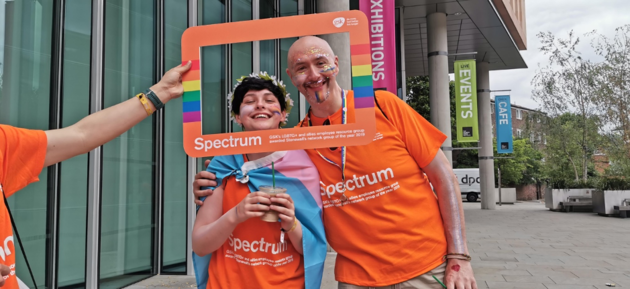
7 tips for raising a transgender child
By Terry, GSK
“Mum, Dad, there's something I need to tell you”. It’s a line that strikes fear and dread into any parent. Is my daughter in trouble at school? Is she having sex? Oh no, is she pregnant? Has she been expelled? Is she moving out – oh god, maybe she’s gay? “Mum, Dad, I think I’m a boy”…
There’s nothing that quite prepares you to handle life’s complexities when it comes to your children, and so it was when my son (then daughter) first came out. I look back on it and I hope that his mum and I handled it well. It was a terrifying time for him, and as a parent it was a terrifying time for us too. Generally, none of us receive training for how to handle this – there is no obvious user manual with instructions to follow.
I look back and I can’t recall the details of it, and it doesn’t matter really – we attempted as parents to support him and handle it as best we could. The year evolved, and he went from lesbian, to non-binary, and finally to transgender.
As a parent, I was filled with fears and anxieties for him – his life, his future, his happiness. I would have considered myself an ally at the time, but I have come to realise over the past few years that allyship isn’t a badge to be worn during pride, but is instead so much more.
It is important to say though that during all of this, the thing that I think made the biggest difference was love, and it’s the reason I share this article. If you are a parent whose child identifies as LGBT+, whether they have yet opened up or not, I thought it useful to share some of useful tips we’ve picked up over the past 4-5 years.
It’s also important to say, we’re still making mistakes – these ‘tips’ aren’t the voice of an expert or someone who’s nailed this. I still get this wrong, I still make mistakes, I still say the wrong thing – it’s a learning journey for all of us, so I keep learning and keep trying...

Attending our first Pride London in 2019 – I’d perhaps overdone the glitter ;)
Be you, and be loving
If anyone ever asks you what you want for your kids, and really delves, you may start with the obvious things – to feel loved, to have happiness, to have health – but you would perhaps find it easy to also have hopes and aspirations for your child. To go to a good university, to have a career, to ‘succeed’. If I’ve learned anything during this time it is that the first two are all that is important. I know my son has said that he doesn’t feel like he’d have made it through had we not been there loving and supporting him. As a parent, there is nothing more important that you can do than to show your child love, support and utter acceptance during this time.
Create a safe space
This is an overwhelmingly vulnerable time for any child, even without the complexity of exploring their own gender or sexual identity. If you make it difficult for your child to talk, you find yourself offering more advice than listening, or you are closed to helping your child explore in safety, you will create the absolute opposite of what you want to achieve. Your child will find other avenues to explore this, they will talk to friends, they will go online, but they will not have that safe and loving back stop. It’s so important to just listen, to try to understand, and to help your child in any way you can.
Seek advice
The majority of us aren’t trained counsellors or therapists, and this will be the first time you’ll have faced anything like this. Make time to read up on the subject, to learn, to talk to LGBT+ friends if you have any, but most importantly seek support for yourself. We helped our son explore this in a safe space via formal pathways too – talking to someone professional who does this sort of thing for a living will never be a bad thing.
Forgive yourself
My wife and I desperately wanted to refer to my son by his chosen name and his new gender identity. But 4 years on and we’ve still found ourselves on the odd occasion going into auto-pilot with either his pronoun or his birth name. It’s utterly accidental, and we are always mortified and apologise straight after. Thankfully the accidents happen less in front of him now and more just if we’re having a conversation as a couple, but it doesn’t make us feel any better. Don’t beat yourself up though – you, like us, will just want your child to be happy and you know that deadnaming or referring to their birth pronouns isn’t going to do that. Apologise, hug, and move on.
Keep talking
We highlighted the importance of listening above, but we’ve certainly found that asking curious and empathetic questions when times are quiet to be useful. Your child could have had a tough day at school or university, they could have been subjected to something hateful, it could be any number of things – keep the dialog going.
Learn
We still feel woefully under-educated, even after 4 years of active reading, learning, talking and being parents. You can never learn enough. There are so many brilliant resources online now – a general search for ‘parent to LGBT child’ brings back a significant number of articles. Be curious with this though – I found the genderbread person really useful to aid in my understanding of gender identity, expression and sexual and romantic attraction. Do your best to learn about the whole LGBT+ community, look at the history. These will all arm you for the next section.
Be an active ally
I’d always considered myself an ally even though I’d never actually done anything about it. As a parent, I’ve been lucky to learn and grow as an active ally, to help in any way I can from my position as a cisgendered, white, hetero male – I’m literally the stereotype for privilege. In recognising that privilege I look for opportunities to help. I mentor and support, I’ve given talks on transgender parenting and allyship, and I share with anyone who is interested. I also challenge and ‘call in’ behaviours when I hear people making negative comments or using hurtful language towards LGBT+ people - it’s so important to not be a bystander and highlight when you feel behaviours are not acceptable. I was lucky enough to attend ally training, organised by GSK and run by Stonewall – it gave me so much more context and insight, and I’ve written up my thoughts in the hopes it helps you with your own allyship.
Conclusion
I come back to the opener to this article. We want our children to be happy, to feel loved, and to be healthy. Anything that we do as parents that doesn’t create the environment where this is the default, we should talk about and change. There is no silver bullet as a parent to ‘get this right’, and my wife and I still make mistakes. Loving your kids, creating that environment where they can be themselves safely – there is no greater gift we can give.

